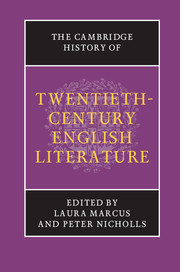Book contents
- Frontmatter
- Introduction
- PART ONE WRITING MODERNITY
- PART TWO THE EMERGING AVANT-GARDE
- PART THREE MODERNISM AND ITS AFTERMATH, 1918–1945
- PART FOUR POST-WAR CULTURES, 1945–1970
- PART FIVE TOWARDS THE MILLENNIUM, 1970–2000
- 32 The Seventies and the cult of culture
- 33 Feminism and writing: the politics of culture
- 34 The half-lives of literary fictions: genre fictions in the late twentieth century
- 35 Theatre and politics
- 36 Irish literature: tradition and modernity
- 37 Scottish literature: Second Renaissance
- 38 Towards devolution: new Welsh writing
- 39 British–Jewish Writing and the turn towards diaspora
- 40 Fiction and postmodernity
- 41 Postcolonial fictions
- 42 Writing lives
- 43 Poetry after 1970
- 44 Ending the century: literature and digital technology
- Bibliography
- Index
- References
41 - Postcolonial fictions
from PART FIVE - TOWARDS THE MILLENNIUM, 1970–2000
Published online by Cambridge University Press: 28 March 2008
- Frontmatter
- Introduction
- PART ONE WRITING MODERNITY
- PART TWO THE EMERGING AVANT-GARDE
- PART THREE MODERNISM AND ITS AFTERMATH, 1918–1945
- PART FOUR POST-WAR CULTURES, 1945–1970
- PART FIVE TOWARDS THE MILLENNIUM, 1970–2000
- 32 The Seventies and the cult of culture
- 33 Feminism and writing: the politics of culture
- 34 The half-lives of literary fictions: genre fictions in the late twentieth century
- 35 Theatre and politics
- 36 Irish literature: tradition and modernity
- 37 Scottish literature: Second Renaissance
- 38 Towards devolution: new Welsh writing
- 39 British–Jewish Writing and the turn towards diaspora
- 40 Fiction and postmodernity
- 41 Postcolonial fictions
- 42 Writing lives
- 43 Poetry after 1970
- 44 Ending the century: literature and digital technology
- Bibliography
- Index
- References
Summary
The 1990s saw the rise and rise of Postcolonial studies. Writers like Salman Rushdie, Arundhati Roy and Zadie Smith became bestselling authors, while most university English departments energetically addressed the discourse known as Postcolonial theory in their undergraduate degrees. This ascendancy reflected the burgeoning growth in quantity and cultural importance of Anglophone literatures from countries other than Britain in the second half of the twentieth century that challenged the construction of the ‘English literary canon’. The somewhat moribund areas of academic literary study previously known as ‘Commonwealth Studies’, ‘New Literatures in English’, ‘World Literature in English’, were revivified as ‘Postcolonial Literatures’.
Yet even as new life was breathed into this body of academic study, debates occurred about whether this was in fact a homogeneous ‘body’ of study. Although the term ‘Postcolonial’ has become the most widely accepted designation for this group of literatures, an extended and sophisticated debate about the usefulness of even the term ‘Postcolonial’ has emerged in the last decades of the century. ‘Postcolonial’ might at first appear to be a ‘period specific’ designation, namely to refer to literature written after colonialism when nations gained their independence from colonising powers, usually from the 1950s onwards. However, this has been recognised as a problematic periodisation, since it fails to take into account the fact that even after independence, literatures from such countries still manifested the effects of ‘neo-colonialism’, or the lingering vestigial cultural remains of the imperial/colonial powers with all their negative and positive effects.
- Type
- Chapter
- Information
- The Cambridge History of Twentieth-Century English Literature , pp. 736 - 750Publisher: Cambridge University PressPrint publication year: 2005
References
- 2
- Cited by

